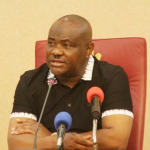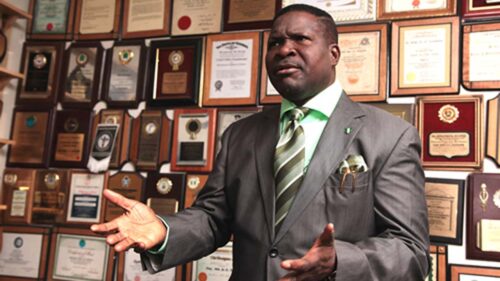MPC: Experts differ on benchmark interest rate

…I expect MPC to reduce MPR to 13.5%, says Uwaleke
…Committee members likely to cut interest rates – FDC
…No, I don’t expect any change in the rates – Adedipe
Expectations are high over the reduction of the Monetary Policy Rate (MPR), as the Monetary Policy Committee (MPC) of the Central Bank of Nigeria (CBN) begin its second meeting of the year between today and tomorrow, but economics and financial experts have expressed divergent opinions on the likely outcome of the of the committee decision on Tuesday in Abuja.
The MPR is the benchmark interest rate for lending in the country, and it was held at its meeting in April 2018, at 14 per cent with the asymmetric corridor at +200 and -500 basis points around the interest rate, and retained the Cash Reserve Ratio (CRR) and Liquidity Ratio (LR) at 22.50per cent and 30 per cent respectively.
After the first meeting, the nation’s economy recent developments and the short-term outlook of the economy favour monetary policy easing, which is required to stimulate economic growth and credit creation.
Just last week, Nigeria’s inflation rate slowed down for the 15th consecutive month to 12.48 per cent in April from 13.34 per cent in March 2018, but the committee at its last meeting had noted that loosening would strengthen the outlook for growth by stimulating domestic aggregate demand through reduced cost of borrowing.
“This may, however, lead to a rise in consumer prices, generating exchange rate pressures on the currency in the process. The Committee also believes that loosening could worsen the current account balance through increased importation.
“On the argument to hold, the Committee believes that key macroeconomic variables have continued to evolve in a positive direction in line with the current stance of macroeconomic policy and should be allowed more time to fully manifest,” the CBN governor, Mr. Godwin Emefiele, explained in a communiqué.
But analysts have said with improved macro economy indicators, the committee might decide to cut-rates in a move to improve money supply and now concentrate on growth in the economy.
Others argued that the committee might maintain rates, in a move to further stabilise the nation’s economy.
Speaking in an exclusive telephone chat with The Daily Times over the weekend, Professor of Economics at the Nasarawa State University, Uche Uwaleke, said that the call to cut the monetary rate becomes necessary as a result of moderation in inflationary pressure, the increase in foreign reserves and stable exchange rate.
Uwaleke added: “I expect the MPC to signal the easing of monetary policy by reducing the monetary policy rate by say 50 basis points from the current 14 per cent to 13.5 per cent.
“This is in view of the moderation in inflationary pressure, the buildup in external reserves and stable exchange rate.
“However, the effect on banking liquidity arising from the implementation of the 2018 budget will be a major consideration. So I don’t expect any deep cut on the policy rate.”
Also, financial analysts at the Financial Derivatives Company (FDC) predicted that the committee members are likely to cut interest rates.
According to them, the declining inflation rate as well as sustained high oil prices is significant good news for the nation’s economy.
They also pointed out that the outlook for agric prices, especially grain prices, was positive as forecast for good weather suggests an increase in output and a fall in prices.
Explaining further on why interest rate has not reduced, Chief Risk Officer, First Bank, Mr. Olusegun Alebiosu, said that the lending rates remain high for a number of reasons.
He noted that savings interest rate is mapped to MPR and MPR is yet to change.
He also mentioned that it is also important to note that CRR is 22 per cent and that has a lot of implications for interest rate which is yet to change.
He said if we still have these two conditions in place, interest rate cannot come down the way they envisage.
Meanwhile, analysts at FSDH said, the nation economy favour monetary policy easing, which is required to stimulate economic growth and credit creation.
“We believe this easing may come in the form of an adjustment to the MPR or an adjustment to the CRR,” it stated.
“The yields on the fixed income securities in Nigeria have declined sharply in the last few months despite the hold in the MPR.
“The yields on the 90-Day, 182-Day and 364-Day Nigerian Treasury Bills (NTBs) primary auction closed at 10.256 per cent, 11.080 per cent and 11.978 per cent on 16 May, 2018 from 12.96 per cent, 14.96 per cent and 16.68 per cent respectively in January 2018.
“The major drivers of the drop in yields are: the strategy of the Debt Management Office (DMO) to restructure the domestic debt portfolio of the FGN in favour of long-term debt, the drop in the inflation rate and other positive developments within the macroeconomic environment.
“The growth in money supply as at April 2018 was lower than the CBN’s target for the year. The broad money (M2) grew by 2.16per cent (annualised to 6.49 per cent), lower than the annual target of 10.98per cent.
Net domestic credit grew by 6.24per cent to N27.48trillion in April 2018, from N25.86trillion in December 2017. The net credit to the private sector shrank marginally by 0.16per cent to N22.25trillion during the same period,” the Lagos based research firm added.
Meanwhile, the founder and Chief Consultant of B. Adedipe Associates Limited, Dr. ‘Biodun Adedipe, has during the weekend at the investiture of Dr. Uche Olowu, Chartered Institute of Bankers of Nigeria (CIBN), said: “I do not expect any change in the rates. The most sensitive price to MPC is inflation rate- the movement in general price level.
“The inflation rate has been going in the right direction. This year’s Federal Government inflation rate forecast for 2018 budget is 12.4 per cent which means the trajectory is moving more in the direction of government. Inflation rate will not be a worry for the committee members right now.
“The major challenge which is what is happening globally is the management of exchange value of the naira. It has proven clearly that having a robust foreign reserve is not a good enough reason for the stability of exchange value of any country’s currency. It is good we have improved foreign reserves but what is also means is that managing the currency has gone beyond the local tradition in economy.
“More attention should be around investors’ confidence. That is what drives the exchange rate in the sense of movement of investible funds. I think the committee will be paying more attention to investors’ confidence. Am happy the Federal Government is also looking in that direction.”
In his own comment, the Managing Director, Enterprises Stockbrokers Limited, Mr. Rotimi Fakayejo, said inflation rate has dropped drastically and there has been stability in the nation’s economy.
He noted that the MPC might want to maintain status quo on its rates on Tuesday.
He explained that, “With the signing of the 2018 budget, more liquidity is going to enter the system. I believe the committee might consider the CRR since there will be more liquidity in the market in the remaining half of 2018.”
Also, Focus Economics in its latest report said: “All of Focus Economics Consensus Forecast panelists expect the CBN to cut the monetary policy rate before the end of the year, with consensus for the rate to end 2018 at 12.11 per cent. In 2019, the panel sees the monetary policy rate ending the year at 11.75 per cent.”










